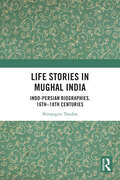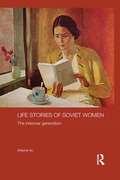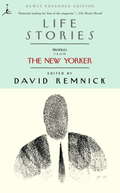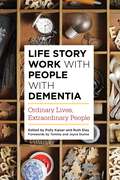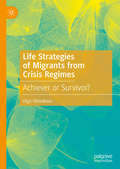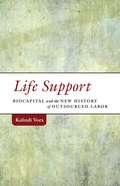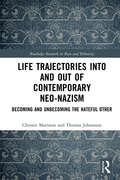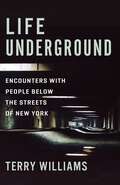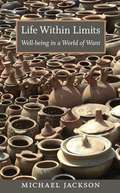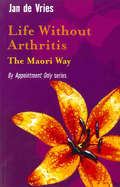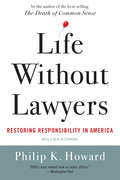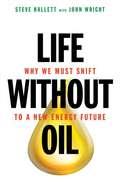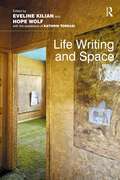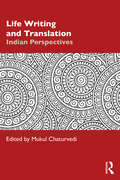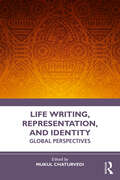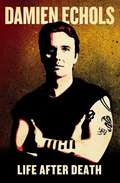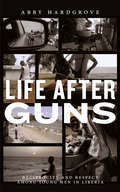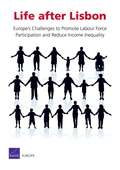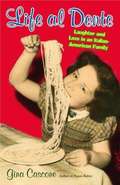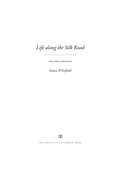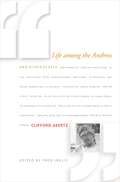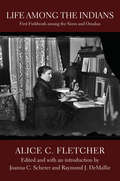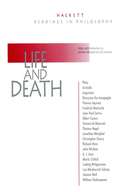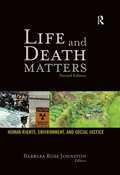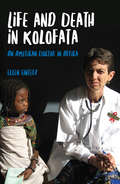- Table View
- List View
Life Stories in Mughal India: Indo-Persian Biographies, 16th-18th centuries
by Shivangini TandonSituated at the intersections between history and literature, the book explores the life-stories written in the Mughal period to recover socio-cultural developments in the period. It focuses on the genre of life-stories and looks at the complex interactions between agency and the ruling structure in shaping historical formations.The biographical dictionaries explored in this book highlight the significance of the agency of political actors, and the strategies through which the aristocrats and the elites reproduced the political system. At the same time, these texts are also quite helpful in recovering processes through which the ordinary people, in routine, everyday forms negotiated with and contested the political system. Delving into the life-narratives preserved in the tazkiras or biographical compendia, this book looks at the household as a political formation and positions the aristocratic households as integral to the reproduction of imperial sovereignty. The work also delves into the world of emotions and argues for the need to draw linkages between political developments and shifts in emotions and affect.This book will be an essential resource for scholars and researchers of history especially early modern history, cultural studies, literature, sociology, South Asian history. It will also be of interest to those studying gender and political discourse in early modern South Asia.
Life Stories of Soviet Women: The Interwar Generation (Routledge Studies in the History of Russia and Eastern Europe)
by Melanie IlicThis book provides a rich picture of what everyday life was like for women in Soviet times by presenting the life stories of eight women who were born in the interwar period. The life stories are told through interviews with the women who were well educated and well placed in Soviet society, often in elite positions, and therefore well able to observe and articulate the wider conditions for Soviet women besides their own personal circumstances. The interviews, which are edited and preceded by a full introduction setting the context, touch on a wide variety of issues: key events in Soviet history; religion and nationalities policies; and women’s everyday experiences of life in the Soviet Union – growing up and going to school; education; falling in love and getting married; giving birth and starting a family; housework and paid employment; travel; leisure and culture; and remembering the past.
Life Stories: Profiles from the New Yorker
by David RemnickOne of art's purest challenges is to translate a human being into words. The New Yorker has met this challenge more successfully and more originally than any other modern American journal. It has indelibly shaped the genre known as the Profile. Starting with light-fantastic evocations of glamorous and idiosyncratic figures of the twenties and thirties, such as Henry Luce and Isadora Duncan, and continuing to the present, with complex pictures of such contemporaries as Mikhail Baryshnikov and Richard Pryor, this collection of New Yorker Profiles presents readers with a portrait gallery of some of the most prominent figures of the twentieth century. These Profiles are literary-journalistic investigations into character and accomplishment, motive and madness, beauty and ugliness, and are unrivalled in their range, their variety of style, and their embrace of humanity.
Life Story Work with People with Dementia: Ordinary Lives, Extraordinary People
by Steve Milton John Shaw Bob Woods Rachel Thompson Lesley Jones Ruth Eley Ponnusamy Subramaniam Victoria Metcalfe Anna Gaughan Joyce Dunne Nada Savitch Jane Mckeown Polly Kaiser Joanne Sutton Maria Pasiecznik Parsons Gillian Drummond Kate Gridley Marie-Jo Guisset Martinez Pat Broster Jean Tottie Tommy DunneIntroducing life story work, a way for people with dementia to connect with their relatives, carers and the professionals working with them. This evidence-based book explains the many benefits of life story work, with practical guidance for introducing it in a variety of settings. The authors show how life story work can empower people with dementia to inform care practitioners and family members what care and support they may need now and in the future, by taking into account their past and their future wishes and aspirations. The book includes practical information on how to get started, ethical considerations such as consent and confidentiality, and considers issues of diversity and how to address them. The voices of practitioners, researchers and family carers sit alongside those of people living with dementia to present a wide-range of perspectives on life story work.
Life Strategies of Migrants from Crisis Regimes: Achiever or Survivor?
by Olga OleinikovaThis book offers a profoundly new examination of life strategies of migrants from regimes in crisis. By focusing on the unique paired comparison of two opposing life strategies—the dynamic, risk-taking and future-oriented ‘achievement life strategy’ and the conservative, risk-minimizing and survival-oriented ‘survival life strategy’—this volume takes migration from post-independence Ukraine to Australia as a central case study to show how people shape their lives in response to regime transitions and crises; what life strategies individuals pursue to cope with social change; and why these individuals chose migration to Australia. Ultimately, the book compels us to reassess what we mean by migration and regime crisis in order to adequately respond to the global challenges confronting numerous democracies today. As such, it will appeal to scholars of sociology and politics with interests in migration, political theory and democracy.
Life Support: Biocapital and the New History of Outsourced Labor (Difference Incorporated)
by Kalindi VoraFrom call centers, overseas domestic labor, and customer care to human organ selling, gestational surrogacy, and knowledge work, such as software programming, life itself is channeled across the globe from one population to another. In Life Support, Kalindi Vora demonstrates how biological bodies have become a new kind of global biocapital. Vora examines how forms of labor serve to support life in the United States at the expense of the lives of people in India. She exposes the ways in which even seemingly inalienable aspects of human life such as care, love, and trust—as well as biological bodies and organs—are not only commodifiable entities but also components essential to contemporary capitalism. As with earlier modes of accumulation, this new global economy has come to rely on the reproduction of life for expansion. Human bodies and subjects are playing a role similar to that of land and natural resource dispossession in the period of capitalist growth during European territorial colonialism. Indeed, the rapid pace at which scientific knowledge of biology and genetics has accelerated has opened up the human body as an extended site for annexation, harvest, dispossession, and production.
Life Trajectories Into and Out of Contemporary Neo-Nazism: Becoming and Unbecoming the Hateful Other (Routledge Research in Race and Ethnicity)
by Thomas Johansson Christer MattssonThis book provides the first comprehensive sociological study of the contemporary National Socialist movement in Sweden, including how it has developed since the 1990s until the present. It covers the ideas and political aspects of the movement, as well as the subjective and very personal stories told by young men and women who in some cases have left the movement and in others remained. Through a large number of detailed stories of the movement’s violence, hatred, and ideology, as well as stories of the life plans and dreams involved in re-entering society, the study on which the book is based provides knowledge, hope and new directions for studies on the National Socialist movement. Additionally, the book provides innovative research on the relation between the life trajectories of National Socialists and their significant others, allowing us to establish better and more scientific strategies for preventing radicalization and promoting de-radicalization. The book is aimed at students of sociology, social science and researchers studying hate movements and violent extremism. It is also meant for professionals such as teachers, social workers and youth workers who may encounter radicalization in their work as well as being a vital contribution for policymakers within the field.
Life Underground: Encounters with People Below the Streets of New York (The Cosmopolitan Life)
by Terry WilliamsAboveground, Manhattan’s Riverside Park provides open space for the densely populated Upper West Side. Beneath its surface run railroad tunnels, disused for decades, where over the years unhoused people have taken shelter. The sociologist Terry Williams ventured into the tunnel residents’ world, seeking to understand life on the margins and out of sight. He visited the tunnels between West Seventy-Second and West Ninety-Sixth Streets hundreds of times from 1991 to 1996, when authorities cleared them out to make way for Amtrak passenger service, and again between 2000 and 2020.Life Underground explores this society below the surface and the varieties of experience among unhoused people. Bringing together anecdotal material, field observations, photographs, transcribed conversations with residents, and excerpts from personal journals, Williams provides a vivid ethnographic portrait of individual people, day-to-day activities, and the social world of the underground and their engagement with the world above, which they call “topside.” He shows how marginalized people strive to make a place for themselves amid neglect and isolation as they struggle for dignity. Featuring Williams’s distinctive ethnographic eye and deep empathy for those on the margins, Life Underground shines a unique light on a vanished subterranean community.
Life Within Limits: Well-being in a World of Want
by Michael JacksonThe sense that well-being remains elusive, transitory, and unevenly distributed is felt by the rich as well as the poor, and in all societies. To explore this condition of existential dissatisfaction, the anthropologist Michael Jackson traveled to Sierra Leone, described in a recent UN report as the "least livable" country in the world. There he revisited the village where he did his first ethnographic fieldwork in 1969-70 and lived in 1979. Jackson writes that Africans have always faced forces from without that imperil their lives and livelihoods. Though these forces have assumed different forms at different times--slave raiding, warfare, epidemic illness, colonial domination, state interference, economic exploitation, and corrupt government--they are subject to the same mix of magical and practical reactions that affluent Westerners deploy against terrorist threats, illegal immigration, market collapse, and economic recession. Both the problem of well-being and the question of what makes life worthwhile are grounded in the mystery of existential discontent--the question as to why human beings, regardless of their external circumstances, are haunted by a sense of insufficiency and loss. While philosophers have often asked the most searching questions regarding the human condition, Jackson suggests that ethnographic method offers one of the most edifying ways of actually exploring those questions.
Life Without Arthritis: The Maori Way
by Jan de VriesIn Life Without Arthritis, Jan de Vries shows how the dietry management of the Maori people is the major source of their continued good health - and that it is a diet now widely available in Western society. He shares the treasures of the Maoris and explains how, by following their example, there can be life without arthritis or rheumatism.
Life Without Lawyers: Restoring Responsibility in America
by Philip K. HowardHow to restore the can-do spirit that made America great, from the author of the best-selling The Death of Common Sense. Americans are losing the freedom to make sense of daily choices--teachers can't maintain order in the classroom, managers are trained to avoid candor, schools ban tag, and companies plaster inane warnings on everything: "Remove Baby Before Folding Stroller." Philip K. Howard's urgent argument is full of examples, often darkly humorous. He describes the historical and cultural forces that led to this mess and lays out the basic shift in approach needed to fix it. Today we are flooded with legal threats that prevent us from taking responsibility. We must rebuild boundaries of law that protect an open field of freedom. The voices here will ring true to every reader. The analysis is powerful, and the solution unavoidable. What's at stake, Howard explains in this seminal book, is the vitality of American culture.
Life Without Oil: Why We Must Shift to a New Energy Future
by John Wright Steve HallettHallett (botany and plant pathology, Purdue U. ), who is joined by John Wright, an energy and environmental journalist, contends that oil and natural gas supplies will wane by the end of the century and that society has failed to see this problem and act on it. He describes the history of the world in terms of energy use, how the petroleum interval of the last century fits into larger civilization, and how the rise of civilizations has been a story of human access to increasingly powerful sources of energy and that problems with access to energy have led to societal collapse. He examines problems that are likely to occur in different countries over the next half century, effects on the global economy, and what can be done about them it by considering nuclear power, reconnecting communities, focusing on sustainable agriculture, and recognizing that the laws of ecology override the economy. Annotation ©2011 Book News, Inc., Portland, OR (booknews.com)
Life Writing and Space
by Eveline Kilian Hope WolfHow does our ability, desire or failure to locate ourselves within space, and with respect to certain places, effect the construction and narration of our identities? Approaching recordings and interpretations of selves, memories and experiences through the lens of theories of space and place, this book brings the recent spatial turn in the Humanities to bear upon the work of life writing. It shows how concepts of subjectivity draw on spatial ideas and metaphors, and how the grounding and uprooting of the self is understood in terms of place. The different chapters investigate ways in which selves are reimagined through relocation and the traversing of spaces and texts. Many are concerned with the politics of space: how racial, social and sexual topographies are navigated in life writing. Some examine how focusing on space, rather than time, impacts upon auto/biographical form. The book blends sustained theoretical reflections with textual analyses and also includes experimental contributions that explore independencies between spaces and selves by combining criticism with autobiography. Together, they testify that life writing can hardly be thought of without its connection to space.
Life Writing and Translation: Indian Perspectives
by Mukul ChaturvediThe steady rise of auto/biographical narrations across various Indian languages, including English and translations into English, as different forms of life writing marks a moment of social and political ferment. This book aims to explore the expansive field of life writing, both as a practice and a genre of literature, and its intersections with translation. Addressing the affinities between life writing and translation, and the emancipatory possibilities it offers, can shift the focus from individual texts to a space for encounter between languages, identities, and cultures.Focusing on how life writing in India has emerged as a distinct literary and publishing phenomenon in recent times, the volume traces the diversity and richness of the various bhasha traditions of life writing and looks at how they have gained recognition both in regional languages and in translation. Traversing various languages, the book examines memoirs of incarceration and exile, narratives of marginality, literary memoirs, biography, and oral songs of protest among others, and engages with life writing’s affective and political potential in documenting everyday lives and struggles, and fostering solidarity among readers. Exploring the ways life writing and translation are mutually implicated, it deliberates on the ethical, political, and translational significance of life writing and seeks to spark academic interest and further research in this field.This volume will serve as a rich resource for university students, researchers, and academics of literature, history, sociology, cultural studies, translation studies, and comparative studies, and those who are interested in South Asian literature.
Life Writing, Representation and Identity: Global Perspectives
by Mukul ChaturvediThis book focuses on varied forms of self-referential storytelling or life writing and its emergence as a democratic and inclusive genre, both globally and in India, and its intersections with history, fiction, memory, truth and identity. The book examines the practice of life writing and its scope for accommodating diverse voices, distinct identities, collaborations and non-hierarchical connections as it gives voice to oral, silenced and marginalized communities. It explores forms like auto/biographical fiction, digital storytelling, graphic memoirs, and testimonies of migration and exile, among others. The eclectic collection of essays in this volume draws attention towards the transformative possibilities of life writing as it engages with issues of resistance, recuperation, re-inscribing individual and collective memories, histories, and promotes an understanding of multicultural others. Focusing on the multiple ways in which the production, circulation, and consumption of life writing has helped to reimagine and redefine individual and collective identities in different cultural and geopolitical contexts, the collection breaks new ground by initiating a cross-cultural perspective in life writing studies. The book aims to encourage critical engagement with a vastly growing body of literature that has seen a publishing and translation boom in contemporary times, both globally and in India. With life writing emerging as a robust area of research, this edited collection provides a much-needed impetus to critically engage with issues of self-representation, memory and identity in recent times. This volume will serve as a significant and rich resource for university students, researchers, and academics of literature, comparative studies, cultural studies, history, indigenous studies and digital and media studies.
Life after Death
by Damien EcholsIn this riveting, explosive classic of prison literature, Echols reveals himself a brilliant writer, infusing his narrative with tragedy and irony in equal measure. He describes the terrors he experienced every day and his outrage toward the American justice system, and offers a firsthand account of living on Death Row in heartbreaking, agonizing detail.
Life after Guns: Reciprocity and Respect among Young Men in Liberia
by Abby HardgroveLife After Guns explores how ex-combatants and other post-war youth negotiated a depleted and difficult social and cultural landscape in the years following Liberia’s fourteen-year bloody civil war. Unlike others who study child soldiers, Abby Hardgrove’s ethnography looks at both former combatants and also the youth who were not recruited to fight. She focuses on the structural constraints and household and family organizations that either helped or limited opportunities as these young men grew into adulthood. Whether young men fought or not, and whether they had cultural capital before the war or not, family relations mattered a great deal in how they fared after the war.
Life after Lisbon
by Stijn Hoorens Priscillia Hunt Christian Van Stolk Flavia Tsang Philipp-Bastian BrutscherThe economic crisis of 2008 has undone much of the progress on improving employment and growth in Europe. The review concludes that policy makers should focus on enabling social policy that allows individuals to achieve their productive potential.
Life al Dente: Laughter and Love in an Italian-American Family
by Gina Casconerity that made Pagen Babies a classic, here is the Italian-American experience served up by the author who has been crowned the Patron Saint of Humor. Before the Sopranos, there were the Cascones. . . . Life al Dente, the new memoir from the author of Pagan Babies, brings the same wit and wonder to the telling of Gina Cascone's Italian-American girlhood . . . well, boyhood actually. In an Italian family, few things are a greater handicap than beir born female, but Gina's Dad generous by decided to overlook this shortcoming and raise Gina as a boy-the son he always wanted. As lawyer to numerous "alleged" mobsters, Dad had some colorful clients who would regularly gather around the basement pool table to talk business, drink, and be hustled by junior high Gina. There was no way Gina was going to turn into one of the big hair girls of Italian-American stereotype, but her journey would have all the bumps that come with that cherished immigrant ambition of moving from steerage to the suburbs in three generations. That sense of dislocation came early for Gina as her family moved from the kind of neighborhood where old men play bocce and the Ftttefnu are named Nunzio to one where frozen food prevails. brains got her into the top high school, she quickly made the lonely discovery that she was the only one there whose name ended in a vowel. In our overly pasteurized and homogenized world, there's a real hunger to find and celebrate our connection to old world roots and traditions. Life al Dente abounds in hilarious stories, but also rewards readers with a genuine and poignant contemplation of cultural identity. with a genuine and poignant contemplation of cultural identity. from the book
Life along the Silk Road
by Susan WhitfieldIn this long-awaited second edition, Susan Whitfield broadens her exploration of the Silk Road and expands her rich and varied portrait of life along the great pre-modern trade routes of Eurasia. This new edition is comprehensively updated to support further understanding of themes relevant to global and comparative history and remains the only history of the Silk Road to reconstruct the route through the personal experiences of travelers. In the first 1,000 years after Christ, merchants, missionaries, monks, mendicants, and military men traveled the vast network of Central Asian tracks that became known as the Silk Road. Whitfield recounts the lives of twelve individuals who lived at different times during this period, including two characters new to this edition: an African shipmaster and a Persian traveler and writer during the Arab caliphate. With these additional tales, Whitfield extends both geographical and chronological scope, bringing into view the maritime links across the Indian Ocean and depicting the network of north-south routes from the Baltic to the Gulf. Throughout the narrative, Whitfield conveys a strong sense of what life was like for ordinary men and women on the Silk Road, the individuals usually forgotten to history. A work of great scholarship, Life along the Silk Road continues to be both accessible and entertaining.
Life among the Anthros and Other Essays
by Clifford GeertzAn incomparable retrospective of writings by one of the world's great anthropologistsClifford Geertz (1926–2006) was perhaps the most influential anthropologist of our time, but his influence extended far beyond his field to encompass all facets of contemporary life. Nowhere were his gifts for directness, humor, and steady revelation more evident than in the pages of the New York Review of Books, where for nearly four decades he shared his acute vision of the world in all its peculiarity. This book brings together the finest of Geertz's review essays from the New York Review along with a representative selection of later pieces written at the height of his powers, some that first appeared in periodicals such as Dissent, others never before published.This collection exemplifies Geertz's extraordinary range of concerns, beginning with his first essay for the Review in 1967, in which he reviews, with muffled hilarity, the anthropologist Bronislaw Malinowski. This book includes Geertz's unflinching meditations on Western academia's encounters with the non-Western world, and on the shifting and clashing places of societies in the world generally. Geertz writes eloquently and arrestingly about such major figures as Gandhi, Foucault, and Genet, and on topics as varied as Islam, globalization, feminism, and the failings of nationalism.Life among the Anthros and Other Essays demonstrates Geertz's uncommon wisdom and consistently keen and hopeful humor, confirming his status as one of our most important and enduring public intellectuals.
Life among the Indians: First Fieldwork among the Sioux and Omahas (Studies in the Anthropology of North American Indians)
by Alice C. FletcherAlice C. Fletcher (1838–1923), one of the few women who became anthropologists in the United States during the nineteenth century, was a pioneer in the practice of participant-observation ethnography. She focused her studies over many years among the Native tribes in Nebraska and South Dakota.Life among the Indians, Fletcher&’s popularized autobiographical memoir written in 1886–87 about her first fieldwork among the Sioux and the Omahas during 1881–82, remained unpublished in Fletcher&’s archives at the Smithsonian Institution for more than one hundred years. In it Fletcher depicts the humor and hardships of her field experiences as a middle-aged woman undertaking anthropological fieldwork alone, while showing genuine respect and compassion for Native ways and beliefs that was far ahead of her time. What emerges is a complex and fascinating picture of a woman questioning the cultural and gender expectations of nineteenth-century America while insightfully portraying rapidly changing reservation life. Fletcher&’s account of her early fieldwork is available here for the first time, accompanied by an essay by the editors that sheds light on Fletcher&’s place in the development of anthropology and the role of women in the discipline.
Life and Death Matters: Human Rights, Environment, and Social Justice, Second Edition
by Barbara Rose JohnstonThe first edition of Life and Death Matters was a breakthrough text, centralizing the experiences of those on the front lines of environmental crises and forging new paradigms for understanding how crises emerge and how different groups of actors respond to them. This second edition, fully updated with both expanded and new chapters, once again provides a benchmark for the field and opens important pathways for further research. Authors reassess the state of scholarship and grassroots activism in a new century when social and environmental systems are being reconceptualised within post-9/11 security and biosecurity frameworks, when global warming and resource scarcity are not fears but realities, when global power and politics are being realigned, and when ecocide, ethnocide, and genocide are daily tragedies. This bold new edition of Life and Death Matters will be a widely used textbook and essential reading for students, scholars, and policy makers.
Life and Death in Kolofata: An American Doctor in Africa
by Ellen EinterzWhen Dr. Ellen Einterz first arrives in the town of Kolofata in Cameroon, the situation is dire: patients are exploited by healthcare workers, unsterilized needles are reused, and only the wealthy can afford care. In Life and Death in Kolofata: An American Doctor in Africa, Einterz tells her remarkable story of delivering healthcare for 24 years in one of the poorest countries in the world, revealing both touching stories of those she is able to help and the terrible suffering of people born in extreme poverty. In one case, a 6-year-old burn victim suffers after an oil tanker tips and catches fire; in another story, Dr. Einterz delivers a child in the front yard of her home. In addition to struggling to cure diseases and injuries and combat malnutrition, Einterz faced another kind of danger: the terrorist organization Boko Haram had successively kidnapped foreigners from Cameroon, and they had set their sights on the American in Kolofata. It would only be a matter of time before they would come for her. Tragic, heartwarming, and at times even humorous, Life and Death in Kolofata illustrates daily life for the people of Cameroon and their doctor, documenting both the incredible human suffering in the world and the difference that can be made by those willing to help.
